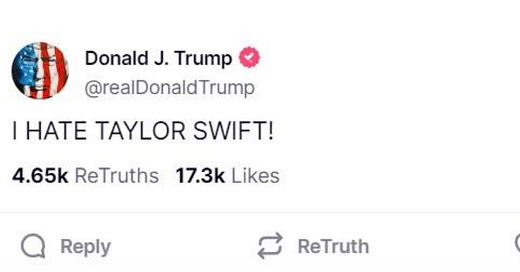The emotion that's not worth it for candidates to express publicly
When Donald Trump said he hated Taylor Swift, he did something new in US presidential history
I’m a lifelong student of history, especially of US presidential history.
While we give thanks to God that former president Donald Trump is safe and his apparent would-be assailant is in custody, Sunday, before that incident, began with something, so far as I know, truly unprecedented in presidential history: Donald Trump, the Republican nominee for president, publicly declared on social media that he hates Taylor Swift.
Swift apparently aroused this expression from the former president because she endorsed his opponent in the November election, Vice President Kamala Harris.
I asked myself if, in the long history of show business celebrity endorsements of presidential candidates, the candidate not endorsed ever made such a public statement of hatred? I scanned my personal memory.
In 1960, Frank Sinatra and the Rat Pack endorsed John F. Kennedy for president. I know of no public statement of hatred toward Sinatra and the others by Richard M. Nixon.
In 1964, Ronald Reagan, actor and then-host of the TV anthology series, Death Valley Days, prominently endorsed the Republican nominee Barry Goldwater in a grainy black and white speech run repeatedly in the days before the November election. I know of no public statement of hatred toward Reagan made by the Democratic nominee, Lyndon Johnson.
In 1968, singer Connie Francis endorsed Nixon. His Democratic opponent Hubert Humphrey didn't publicly say he hated Francis.
In 1972, even as he was compiling enemies lists in the White House, Richard Nixon didn’t tell the world how much he hated the many stars who were campaigning for his opponent, George McGovern.
On and on the list could go.
But on Sunday, the Lord’s Day, Donald Trump posted on his own company’s social media site, “I hate Taylor Swift.”
I’m not saying that past presidential nominees might not have harbored hateful feelings toward the entertainment celebs who opposed them. We don’t know about most of them and that’s probably because they concluded it’s a losing proposition to appear to hate people simply for expressing their political opinions. (Nixon tried keeping his hates secret. But they did inform the actions of his campaign and re-election committees, bringing a sad and unceremonious end to his presidency.)
The other reason it’s not good for presidential candidates to vent hatred toward stars who endorse opponents is that experience has shown through the years that endorsements don’t mean that much. That seems true even of the Swift endorsement. One poll I saw mentioned today shows that the endorsement of Vice President Harris by Taylor Swift, the latter the biggest superstar in the world right now, had influenced 6% of the voting population to “consider” voting for Harris, while another 81% said it would have no influence on them. Celebrity endorsements mean little.
In the waning days of his landslide loss to Nixon in 1972, a frustrated George McGovern was taunted by a crowd member for being so clearly on the path to defeat. McGovern told the person to kiss his backside. (I paraphrase.) On election night, as he conceded defeat, McGovern publicly apologized to the man to whom he’d made that comment. McGovern’s apology signaled his recognition that people who run for president are auditioning for an important job, one in which they’ll be expected to keep their cool, not lose it, and that people are allowed to disagree even with would-be presidents.
The record is clear: US presidents who routinely act out of hatred, revenge, or vindictiveness lose public support and public confidence. Maybe today, an aide to Mr. Trump is reminding him of that fact.




